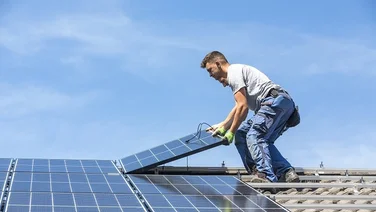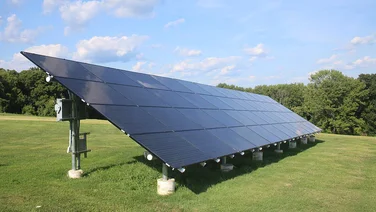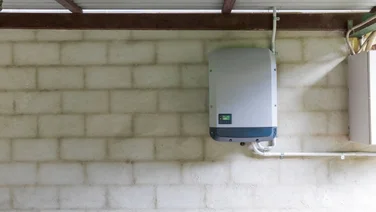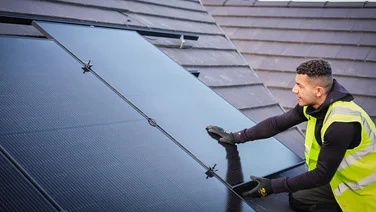We receive a small fee from trusted installers when you request a quote through our site. This helps us keep our content independent, well-researched and up to date – Learn more
- What are solar water heaters?
- Pros and cons of solar water heaters
- Types of solar water heaters
- How much do solar water heaters cost?
- How much hot water can solar water heaters provide?
- How much can you save with a solar water heater?
- Are there any government grants for solar water heaters?
- Is your property suitable for a solar water heater?
- Solar water heaters maintenance costs
- How many homes in the UK have solar water heaters?
- How to get the most out of your solar water heaters
- Next steps
- Solar water heaters cost between £3,000 and £6,000
- They can cut the cost of hot water heating by up to 60%
- Solar water heaters can cut your carbon emissions by 400kg per year

If you’re looking to heat your household water with renewable energy, solar water heaters are for you. They’re one of many different types of solar technology that can massively cut your bills.
In this article, we’ll discuss the ins and outs of solar thermal energy, and whether they’re a suitable option for your home.
If you’re also interested in installing regular solar PV panels, and want to see how much this would cost you, fill in this form. You’ll receive free quotes for solar PV from trusted suppliers.
Where do you want to install solar panels?
Get startedWhat are solar water heaters?
Solar water heaters (also known as solar thermal panels or ‘collectors’) absorb the sun’s rays to heat up household water, which can then be used for showering, washing clothes, and other daily tasks.
This renewable system will reduce your energy consumption substantially, and chop a few pounds off your monthly bills.
How do solar water heaters work?
Solar water heater systems use either flat plate panels or evacuated tube collectors to absorb the sun’s warmth. These units are usually installed on the roof of the property, which gives them optimal exposure to the sun and allows them to heat up using solar energy.
However, the liquid inside the panels or tubes is not the water that gets used in the home. It’s typically a mix of glycol and water, which is heated naturally by the sun and flows to a heat exchanger fitted inside a hot water cylinder or water tank. The glycol and water mix transfers its heat to the water, which will then be used throughout the home.
Since solar water heaters can be added to an existing water-heating system, installation isn’t complex. Conventional boilers and immersion heaters are both compatible with solar hot water heater systems, and can be used to make the water even hotter, or as supplemental heat on particularly cloudy days.
They can also be used for systems such as solar-powered underfloor heating.

A solar water heater system that uses flat plate panels

A solar water heater system that uses evacuated tubes
Where do you want to install solar panels?
Get startedPros and cons of solar water heaters
- Cut down energy bills
- Low maintenance
- Most come with a 5-10 year warranty
- Lower your carbon footprint
- Cheaper than solar PV panels
- You’ll still need a boiler to make water hotter
- Not all boilers are compatible with solar water heating
- Expensive
- Dependent on the season
Types of solar water heaters
There are four types of solar water heating systems, all varying in the way they absorb heat:
- Active – Relies on external electric power to activate pumps (so not 100% renewable)
- Passive – Relies on the natural transfer of heat from the sun to circulate the hot water, rather than electricity
- Direct – The water is heated directly by the solar panel/collector
- Indirect – The water is heated by fluid (typically a mixture of water and glycol) being circulated between the rooftop thermal collector and a heat exchanger.
The two most common collectors for domestic use are flat plate panels and evacuated tube collectors.
Flat plate panels look similar to solar PV panels. A heat-absorption panel is attached to multiple copper pipes, which the water or transfer fluid passes through. A sheet of glass covers this panel, acting both as protection and insulation.
Evacuated tube collectors consist of multiple heat pipes, which are all surrounded by glass tubes. The glass tubes are all vacuumed, adding air-tight insulation.
There are also hybrid solar panels, which use sunlight to generate both heat and electricity.
How much do solar water heaters cost?
The average solar water heater system costs between £2,700 and £5,500 to install.
We know, this is a hefty sum of money – but solar panel costs are decreasing, and once the panels are installed, you can reap the renewable reward and watch your bills gradually decrease.
| Size of the system | Number of people in the house | Average cost |
|---|---|---|
2m² | 2-3 | £2,700–£3,200 |
3m² | 3-4 | £3,200–£3,500 |
4m² | 4-5 | £3,500–£4,000 |
5m² | 5-6 | £4,000–£5,000 |
6m² | 6-7 | £5,000–£5,500 |
Want to learn more? Check out our helpful page: Is Solar Thermal Worth It In The UK?
How many solar water heaters do you need?
To heat enough water for a typical three-bedroom house, homeowners will need two to three flat plate panels, or 20–30 individual evacuated tubes – tubes are usually sold in fixed sets of around 10 to 15.
In other words, you’ll need to allocate about 2 square metres per household member for your panels or tubes.
Most properties will also need a water cylinder that is around two times as large as a standard one. This is because it’ll need to house the heat exchanger system and store enough hot water to be used when your solar water heater system is less effective, such as on cloudy days.
| Size of property | Number of solar thermal panels |
|---|---|
1-2-bedroom | 1 |
2-bedroom | 1-2 |
3 bedroom | 2-3 |
4+ bedroom | 4 |
How much hot water can solar water heaters provide?
A solar water heater can provide 25% of a home’s hot water needs in the winter, and 90% of its hot water needs in the summer.
This means you’ll need to use another water heating system to make up the difference, especially in the winter months. Thankfully, solar water heaters can be combined with a boiler or an electric immersion heater, which is fitted inside your hot water tank or cylinder.
Want to learn more? Check out our helpful guide Can Solar Panels Heat A House In The UK?
How much can you save with a solar water heater?
The amount of money you can save with a solar water heater will fluctuate throughout the year, with systems providing nearly all of a household’s hot water in the summer, but less during the winter months.
Savings will also depend on what you’re swapping it for. Take a look at the list below to see how much money you could save by swapping different systems for a solar water heater:
- Gas boiler – You’ll save £125 on annual energy bills and reduce your carbon footprint by 330 kg per year
- Oil boiler – You’ll save £140 on annual energy bills and reduce your carbon footprint by 465 kg per year
- Coal – You’ll save £205 on annual energy bills and reduce your carbon footprint by 930 kg per year
- Electric boiler – You’ll save £245 on annual energy bills and reduce your carbon footprint by 310 kg per year
- Liquefied petroleum gas (LPG) – You’ll save £135 on annual energy bills and reduce your carbon footprint by 370 kg per year
These figures are correct as of August 2023, and are based on calculations from the Energy Savings Trust.
Are there any government grants for solar water heaters?
Up until March 2025, the only government grant for solar water heaters was the Home Upgrade Grant. It was available in 45 local councils in England and could cover up to 10% of the funding for solar water heaters.
This has now largely been replaced with Warm Homes Local Grant, which is available across England and provides funding for low-income households with an EPC rating between D and G.
The grant covers various energy efficiency measures, including solar water heaters, particularly for homes off the gas grid. The lack of government grants for solar water heaters is partly because they’re less popular than other low-carbon technologies, such as solar PV panels or heat pumps, and because they still need to be paired with another heating system to be effective.
Want to learn more about solar incentives? Check out our helpful page: UK Solar Panel Grants, Funding & Schemes.
Is your property suitable for a solar water heater?
Like solar PV panels, solar water heaters work best when they are installed on properties with a south facing roof, since they’ll be exposed to more sunlight throughout the day.
If this isn’t possible, placing solar water heaters on east or west facing roofs will still provide at least some heat.
A property will also need enough roof space to accommodate either solar flat plate panels or tubes – about two to five square metres. It’ll also need enough indoor space to accommodate a hot water tank or cylinder, if one isn’t already installed.
It’s also important to note that homeowners living in a listed or conservation area property might not be allowed to install a solar water heater. This is because there are restrictions on making changes to the appearance of these buildings, which can make obtaining planning permission for solar water heaters difficult.
Solar water heaters maintenance costs
After forking out the initial sum, you’ll be glad to hear that most solar water-heating systems require very little maintenance.
Unlike a boiler, solar water heaters only need to be serviced every 3-7 years, unless you have any suspicious leaks that need checking out.
Over time, a few things may need tidying up, but minor tweaks won’t break the bank. The antifreeze that is used to protect the system in the winter months will need topping up. Keeping on top of this is important, as it can reduce the efficiency of your system – luckily for you, replacing the antifreeze needs to be done every 3-5 years, and will only set you back around £100.
As well as replacing the antifreeze, you’ll want to keep an eye on the system’s heat pumps. If the pumps are suffering from a bit of wear and tear, replacing them only costs around £90.
So, despite the initial cost of installing a solar water heater, you shouldn’t expect any nasty financial surprises along the way.

How many homes in the UK have solar water heaters?
Around 43,667 homes across the UK have solar water heaters installed, according to MCS data, as of August 2023.
This number is significantly lower than other low-carbon heating systems, such as air source heat pumps. For context, there are around 1,574,541 air source heat pumps installed in the UK so far, according to MCS.
This level of popularity might partly be because heat pumps are a more reliable type of low-carbon tech than solar water heating, and don’t usually require a backup in the winter.
How to get the most out of your solar water heaters
- Make sure your hot water cylinder and pipes are well insulated. This will reduce heat loss around the cylinder, and increase the overall efficiency of the system
- Choose a large cylinder. During colder months, your panels won’t be able to absorb as much heat. By having a larger cylinder, you’ll be able to store more hot water for when the panels have stopped working for the day
- Keep an eye on the temperature. Make sure the temperature of your cylinder reaches more than 60ºC at least once a week to avoid any build-up of bacteria in the water
- Be smart with your water consumption. Simple things, like showering in the evening, will make a difference – this is much more efficient than letting your hot water lose heat overnight, then firing up the boiler for a shower the following morning. You can check how much water you’re consuming by installing a water meter.
Next steps
If you have the right type of property, solar water heaters are a worthwhile investment – and can save you a considerable amount each year on bills.
However, one of the downsides to solar thermal energy is that it’s limited to just heating household water. Plus, in colder months, you are still reliant on your boiler to give your panels a helping hand. So, although you’ll be reducing your carbon footprint (and your bills), solar thermal energy is still quite limited.
Solar panels, on the other hand, can work much more effectively – plus 65% of people would now buy a house with solar panels, according to our latest National Home Energy Survey.
If regular solar PV panels, which produce electricity to power your home, sound like a better option, our experts can pick out the perfect panels for your home. Simply tell us a bit about your property, and our installers will be in touch shortly with free solar PV panel quotes for you to compare.









